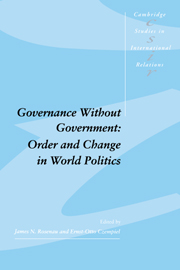Book contents
- Frontmatter
- Contents
- Notes on contributors
- Preface
- 1 Governance, order, and change in world politics
- 2 Governance without government: polyarchy in nineteenth-century European international politics
- 3 The decaying pillars of the Westphalian temple: implications for international order and governance
- 4 The “triumph” of neoclassical economics in the developing world: policy convergence and bases of governance in the international economic order
- 5 Towards a post-hegemonic conceptualization of v/orld order: reflections on the relevancy of Ibn Khaldun
- 6 The effectiveness of international institutions: hard cases and critical variables
- 7 Explaining the regulation of transnational practices: a state-building approach
- 8 “And still it moves!” State interests and social forces in the European Community
- 9 Governance and democratization
- 10 Citizenship in a changing global order
- Index
1 - Governance, order, and change in world politics
Published online by Cambridge University Press: 13 October 2009
- Frontmatter
- Contents
- Notes on contributors
- Preface
- 1 Governance, order, and change in world politics
- 2 Governance without government: polyarchy in nineteenth-century European international politics
- 3 The decaying pillars of the Westphalian temple: implications for international order and governance
- 4 The “triumph” of neoclassical economics in the developing world: policy convergence and bases of governance in the international economic order
- 5 Towards a post-hegemonic conceptualization of v/orld order: reflections on the relevancy of Ibn Khaldun
- 6 The effectiveness of international institutions: hard cases and critical variables
- 7 Explaining the regulation of transnational practices: a state-building approach
- 8 “And still it moves!” State interests and social forces in the European Community
- 9 Governance and democratization
- 10 Citizenship in a changing global order
- Index
Summary
At a time when hegemons are declining, when boundaries (and the walls that seal them) are disappearing, when the squares of the world's cities are crowded with citizens challenging authorities, when military alliances are losing their viability – to mention but a few of the myriad changes that are transforming world politics – the prospects for global order and governance have become a transcendent issue. As the scope of the transformation widens and as its pace intensifies, the more urgent do questions about the nature of order and governance become. Change means the attrition of established patterns, the lessening of order, and the faltering of governance, until such time as new patterns can form and get embedded in the routines of world politics. Such is the situation today. One senses that the course of history is at a turning point, a juncture where the opportunities for movement toward peaceful cooperation, expanded human rights, and higher standards of living are hardly less conspicuous than the prospects for intensified group conflicts, deteriorating social systems, and worsening environmental conditions. Either set of arrangements – and possibly both – could evolve as leaders and publics get accustomed to the heady realization that some control over the future has been regained as a consequence of all the changes.
- Type
- Chapter
- Information
- Governance without GovernmentOrder and Change in World Politics, pp. 1 - 29Publisher: Cambridge University PressPrint publication year: 1992
- 256
- Cited by



